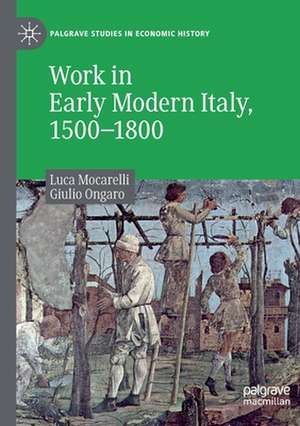Work in Early Modern Italy, 1500–1800: Palgrave Studies in Economic History
Autor Luca Mocarelli, Giulio Ongaroen Limba Engleză Paperback – 12 sep 2020
| Toate formatele și edițiile | Preț | Express |
|---|---|---|
| Paperback (1) | 576.09 lei 6-8 săpt. | |
| Springer International Publishing – 12 sep 2020 | 576.09 lei 6-8 săpt. | |
| Hardback (1) | 581.33 lei 6-8 săpt. | |
| Springer International Publishing – 12 sep 2019 | 581.33 lei 6-8 săpt. |
Din seria Palgrave Studies in Economic History
-
 Preț: 497.34 lei
Preț: 497.34 lei -
 Preț: 358.22 lei
Preț: 358.22 lei - 15%
 Preț: 580.36 lei
Preț: 580.36 lei - 20%
 Preț: 939.29 lei
Preț: 939.29 lei -
 Preț: 292.28 lei
Preț: 292.28 lei - 17%
 Preț: 361.80 lei
Preț: 361.80 lei -
 Preț: 357.89 lei
Preț: 357.89 lei - 20%
 Preț: 690.48 lei
Preț: 690.48 lei - 17%
 Preț: 361.39 lei
Preț: 361.39 lei - 18%
 Preț: 945.79 lei
Preț: 945.79 lei - 18%
 Preț: 1012.53 lei
Preț: 1012.53 lei - 15%
 Preț: 700.29 lei
Preț: 700.29 lei - 18%
 Preț: 782.42 lei
Preț: 782.42 lei -
 Preț: 232.82 lei
Preț: 232.82 lei - 15%
 Preț: 644.82 lei
Preț: 644.82 lei -
 Preț: 384.31 lei
Preț: 384.31 lei - 15%
 Preț: 587.85 lei
Preț: 587.85 lei - 18%
 Preț: 899.21 lei
Preț: 899.21 lei - 18%
 Preț: 786.66 lei
Preț: 786.66 lei -
 Preț: 397.97 lei
Preț: 397.97 lei -
 Preț: 388.90 lei
Preț: 388.90 lei - 18%
 Preț: 737.57 lei
Preț: 737.57 lei -
 Preț: 387.20 lei
Preț: 387.20 lei - 15%
 Preț: 647.73 lei
Preț: 647.73 lei - 15%
 Preț: 646.62 lei
Preț: 646.62 lei -
 Preț: 419.06 lei
Preț: 419.06 lei - 15%
 Preț: 459.06 lei
Preț: 459.06 lei - 15%
 Preț: 712.22 lei
Preț: 712.22 lei - 18%
 Preț: 787.47 lei
Preț: 787.47 lei - 18%
 Preț: 1128.57 lei
Preț: 1128.57 lei - 18%
 Preț: 949.55 lei
Preț: 949.55 lei - 15%
 Preț: 471.53 lei
Preț: 471.53 lei - 15%
 Preț: 640.88 lei
Preț: 640.88 lei - 18%
 Preț: 898.26 lei
Preț: 898.26 lei - 18%
 Preț: 1394.21 lei
Preț: 1394.21 lei -
 Preț: 422.90 lei
Preț: 422.90 lei - 18%
 Preț: 955.40 lei
Preț: 955.40 lei - 18%
 Preț: 730.47 lei
Preț: 730.47 lei - 15%
 Preț: 711.56 lei
Preț: 711.56 lei - 18%
 Preț: 783.98 lei
Preț: 783.98 lei - 18%
 Preț: 900.01 lei
Preț: 900.01 lei - 18%
 Preț: 896.08 lei
Preț: 896.08 lei - 15%
 Preț: 705.83 lei
Preț: 705.83 lei - 18%
 Preț: 787.15 lei
Preț: 787.15 lei - 15%
 Preț: 704.69 lei
Preț: 704.69 lei - 18%
 Preț: 1112.48 lei
Preț: 1112.48 lei
Preț: 576.09 lei
Preț vechi: 677.75 lei
-15% Nou
Puncte Express: 864
Preț estimativ în valută:
110.25€ • 119.71$ • 92.61£
110.25€ • 119.71$ • 92.61£
Carte tipărită la comandă
Livrare economică 22 aprilie-06 mai
Preluare comenzi: 021 569.72.76
Specificații
ISBN-13: 9783030265489
ISBN-10: 303026548X
Pagini: 148
Ilustrații: XII, 148 p. 1 illus.
Dimensiuni: 148 x 210 mm
Greutate: 0.2 kg
Ediția:1st ed. 2019
Editura: Springer International Publishing
Colecția Palgrave Macmillan
Seria Palgrave Studies in Economic History
Locul publicării:Cham, Switzerland
ISBN-10: 303026548X
Pagini: 148
Ilustrații: XII, 148 p. 1 illus.
Dimensiuni: 148 x 210 mm
Greutate: 0.2 kg
Ediția:1st ed. 2019
Editura: Springer International Publishing
Colecția Palgrave Macmillan
Seria Palgrave Studies in Economic History
Locul publicării:Cham, Switzerland
Cuprins
1. Work and Labour: Meanings and Concepts.- 2. Population, Urbanization and Working People.- 3. Technology, Markets, Specializations and Organization of Production.- 4. Labour Relations.- 5. Labour Conditions.- 5. Work and the Little Divergence.
Notă biografică
Luca Mocarelli is Professor in Economic History at the University of Milan-Bicocca, Italy. He is President of the International Association for Alpine History, Vice President of the Italian Association of Urban History and a member of the management committee of the Italian Society of Historical Demography. His research focuses on labour, environmental and markets history.
Giulio Ongaro is Researcher in Economic History at the University of Milan-Bicocca, Italy. He is a member of the management committee of the European Rural History Organisation and a coordinator of research groups within the European Labour History Network and the Italian Society of Labour History. His research focuses on the Republic of Venice and the Papal States in the early modern period.
Giulio Ongaro is Researcher in Economic History at the University of Milan-Bicocca, Italy. He is a member of the management committee of the European Rural History Organisation and a coordinator of research groups within the European Labour History Network and the Italian Society of Labour History. His research focuses on the Republic of Venice and the Papal States in the early modern period.
Textul de pe ultima copertă
Recent decades have seen many economic history books and articles published about working men and women, small and big entrepreneurs, guilds and state manufactures, farmers and journeymen, and children and citizens. Studies have been conducted both at a macro and a micro level, at a global and at a local scale and with regional and national approaches aimed at analysing cultural, social and economic phenomena associated with the world of work. Yet, there is still new ground to be covered. This book aims to fill a gap in early modern history by presenting new insights in the study of global labour history. It considers the whole Italian peninsula as one geographical unit of analysis, encompassing all of the features that characterize labour cultures during the early modern period. It details the evolution of forms of labour in both agriculture and manufacture and the role of labour as an economic, social and cultural factor in the evolution of the Italian area.
Caracteristici
Analyses the evolution of the idea of work in the early modern period Shows the evolution of forms of labour in both agriculture and manufacturing Demonstrates the role that labour as an economic, social and cultural factor has played in the evolution of geographical areas
